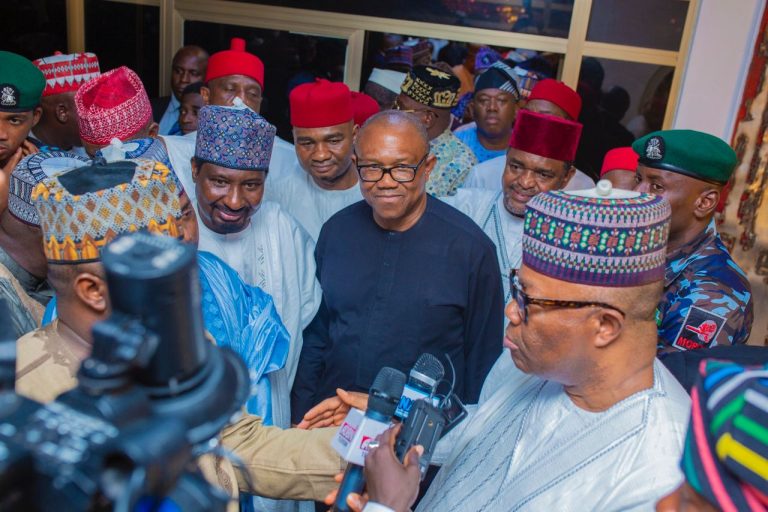Peter Obi, the presidential candidate of the Labour Party who placed third in the last election, was a surprise guest at the wedding ceremony of Amir, the son of Deputy Senate President Barau Jibrin in Kano on Friday.
He was there alongside political bigwigs led by Vice President Kashim Shettima and members of the National Assembly, including Senate President Godswill Akpabio.
His unusual attendance caused a stir at the event as he openly fraternised with politicians, particularly those of the northern extraction, whom he had derided in the past or watched as his ‘Obidient’ supporters — who are infamous for intimidation and abuse — pilloried them online using ethnic and religious slurs.
Although Senate President Akpabio described Obi’s surprise attendance as a sign of a United Nigeria after tense electoral contests, other political watchers believe the move was part of calculated efforts by the former Anambra Governor to revive his fast-declining political stock due to his estrangement from Nigeria’s vast Muslim community.
The estrangement is caused by many factors and events, including Obi’s dangerous description of the last presidential election as a ‘religious war’ in a controversial phone call with Bishop David Oyedepo that was leaked.
His bid for the presidency was also marked by dramatic appearances at churches and prayer grounds where he made inciting remarks, including a call for the “church [to] take back your country.”
In addition to the naked exploitation of faith, Obi also ruled himself out of contention in Muslim-majority northern Nigeria with his repeated association of the region with poverty and violence.
Through speeches, public statements and other media engagement efforts, Obi was unyielding in his description of the north as a poor, desolate and volatile region housing the country’s impoverished and illiterate class.
The simplistic north-south bifurcation, in which a region is depicted as the source of the country’s woes, is fueled by bigotry and dangerous notions of ethnic supremacy, analysts have said.
Events after the conclusion of the election have shown Obi that he has been ruled ‘unelectable’ by northern Nigeria, an outcome that renders his presidential ambition a pipe dream.
Unwilling to abandon the dream, Obi has embarked on a series of PR efforts to fix the battered relationship, including invocation of the Quran in public statements.
His attendance at the party is said to be part of the efforts as he hopes to mount another challenge in 2027 when the country’s next presidential election is scheduled to take place.

